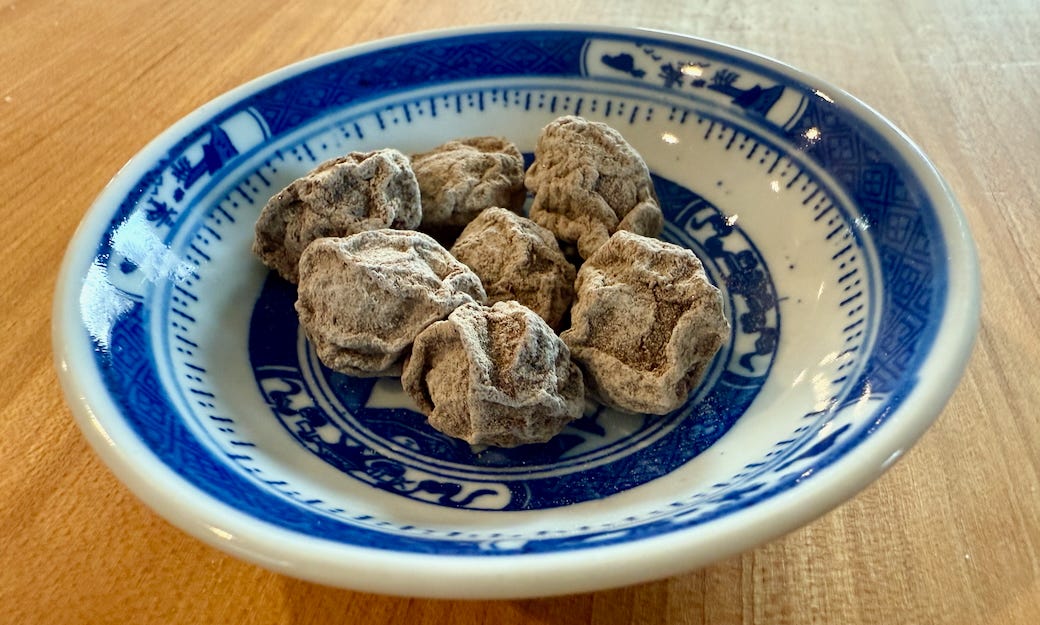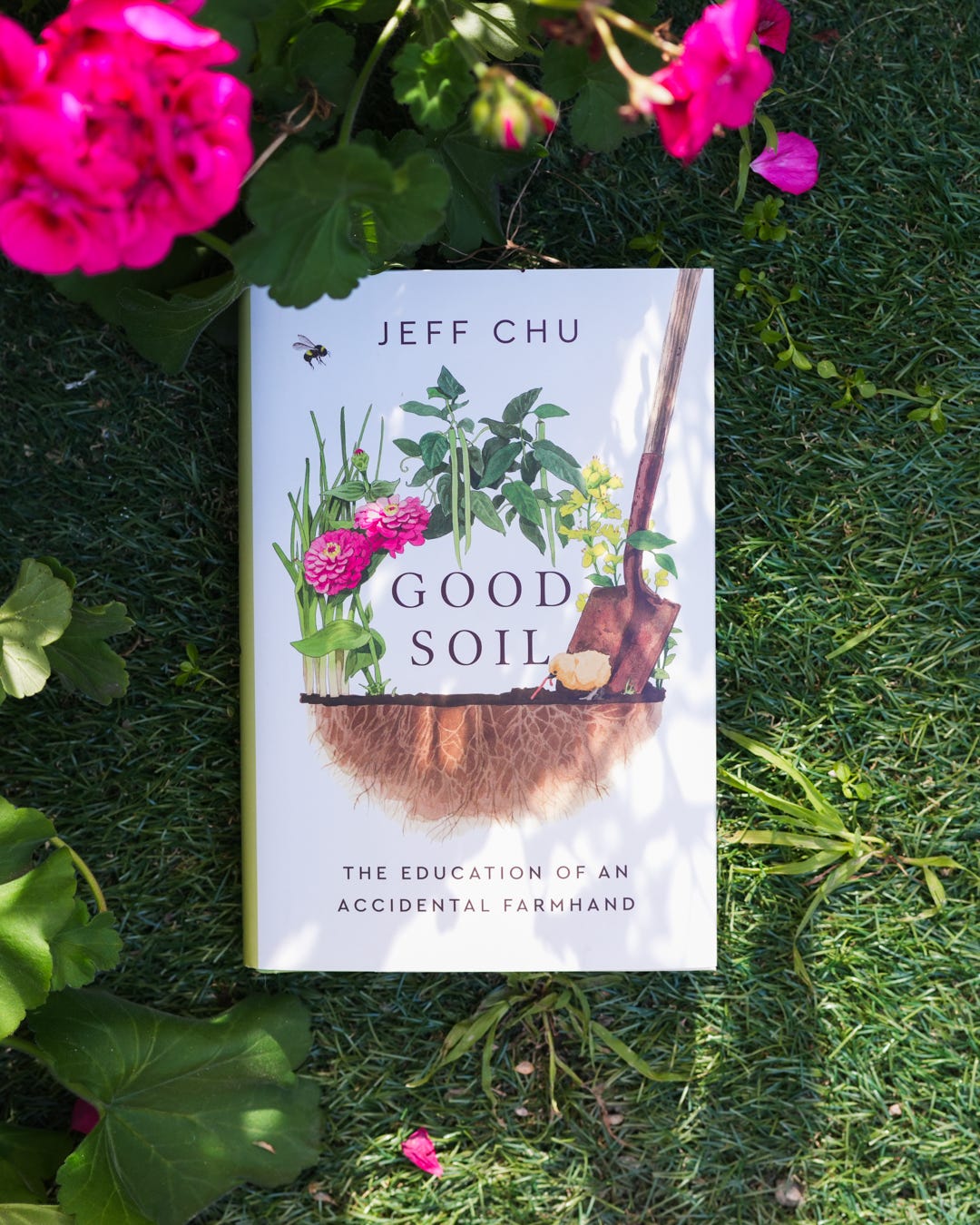Lent II: Sour
Some fragmented thoughts on dried plums, plum blossoms, perspective, patience, and more dates for the Good Soil tour
March 15, 2025
Grand Rapids, Mich.
Once or twice a year, a care package will arrive at our house. It’s from my mom.
It’s always one of those flat-rate priority-mail boxes, and it’s as if she takes it as a personal challenge to test the capacity of that container, because our people are all about maximizing value. Hence the multiple cans of abalone she has brought back from Hong Kong; the dried mushrooms and dried scallops; Emergen-C, which she wants me to take when I travel; almond cookies and walnut cookies, also from Hong Kong; fiber supplements; dried apples, made from the fruit of a friend’s tree, because she knows Tristan likes them. Always some Chinese ointment or tincture that I never remember to use—or how to use. Occasionally, a scarf she has knitted.
There’s usually also a package of 話梅—in Cantonese, that’s pronounced “wah mui,” with a rising tone at the end. This traditional Chinese snack, also popular in Hawaii, where it’s called “li hing mui,” is a dried, preserved plum. It’s not a prune; prunes still have some moisture, some chew. 話梅 has been completely dried, until an entire juicy plum shrivels into something resembling a tiny gray-brown brain. They’re then coated in finely powdered salt, sugar, and a touch of licorice. They’re ugly—and so tasty.
Nobody else in my family likes them.
話梅 reminds me of being at my grandparents’ apartment. My grandmother always kept a glass jar of them in the kitchen, and I’d pluck one out and tuck it on the side of my mouth. Putting the thing directly on your tongue can be overwhelming and sharp. It really is sour.
--
The Chinese plum tree (Prunus mume) buds in midsummer, but it doesn’t fully flower until January, when the late- winter cold stirs the buds awake. Then the plum’s bare branches unfurl clouds of white blossoms, some blushing slightly pink, others tinged with green.
In the fifth and sixth centuries, Chinese poets and philosophers regularly maligned the flower. How rude that it should make such an ostentatious appearance when the season clearly called for austerity. How unseemly that it should show off when most other plants lay dormant. How obnoxious that it should want this spotlight for itself.

Within a few centuries, though, the plum blossom experienced reputational rehab. Perhaps, some writers speculated, this bloom could be understood not as a show-off but as a sign. Perhaps it came as a messenger of resilience, flowering when nothing else could. Perhaps it was not late, but early. “Amid all that has fallen, the fragrant plum alone flourishes / only it possesses the little garden,” the Song dynasty poet Lin Bu writes in his poem “Little Plum Blossom in a Mountain Garden.”
The plum blossom became a sign of hope, a herald of the coming of spring.
--
I have been feeling rather sour, and not in a particularly good way.
The word “sour” has long described the tartness that comes, perhaps paradoxically, either from unripeness or too ripeness—say, fermentation. The OED traces the flavor aspect of this word at least to the middle of the 12th century.
Watch enough cooking-competition shows, as we do in our house, and you’ll notice how the judges always want a little bit of acid—a squeeze of citrus, a splash of vinegar, a bit of buttermilk in a batter. It can enliven and brighten, cutting through fat and mitigating salt. But too much and everything is thrown off-balance.
Within a couple hundred years of the entry of “sour” into common usage, it also got a second definition, which describes one’s mood or sentiment: disagreeable, cranky, crabby, even resentful.
I have been feeling rather sour, and not in a 話梅 way.
I feel it when I read the news from Washington. When I hear stories from parishioners of familial estrangement, of relationships strained and even broken. When I watch angry screeds flying in every direction on social media. When I read misinformation from across the political spectrum. When I witness what is supposed to be good news twisted and spun and contorted until it is no longer good at all. When I doomscroll.
Then I feel what I’ve felt when I have popped a 話梅 into my mouth with haste and without thought. It’s just too much, and I want to spit it out.
--
Like so many other plants, the Chinese plum tree prefers full sunshine and fertile, well-drained soil. But over the millennia, it has proved itself to be adaptable to all kinds of growing conditions.
“Amid all that has fallen, the fragrant plum alone flourishes.”
Classical Chinese poetry defies easy translation, but that’s my best attempt. That first line from Lin Bu can be read literally as “great fragrance astounds fall alone beautiful genial.” For the original audience, each word, each phrase, evoked worlds. Between each character, one can imagine white space, which the reader is invited to fill with their own knowledge, their own experience, much like an impressionist painting in written form.
The poet Edward C. Chang renders it this way: “The plum tree is the only one in blossom after all other flowers have fallen.” The translator Red Pine took a different approach: “When everything has faded they alone shine forth.”
Which translation is right? It might seem odd, but it isn’t inaccurate to say all of them. The classical Chinese poet’s goal was an austerity of language that, paradoxically, created a wide-open hospitality. He—and it was almost always a “he”—tacitly acknowledged that every encounter with a poem would be unique, every reading an interaction between the same words and a different spirit. There is no key to unlocking the precise meaning, because a poem is not a puzzle to be solved. Each reader encounters a poem as nobody else ever has.
Memory feels much the same way to me: snippets, fragments, a word here or there. Scientists might tell us what they know about how it works, hypothesizing about why some wisps become vivid, even concrete, while others vanish. Yet none of us can access an unedited chronicle of what happened— and this seems as true of yesterday as it is of yesteryear.

But this, too, was true: If I were in a mountain garden in winter, my focus would be on the lifeless leaves and the forbidding crunch of the ice on the ground, not the plum blossom stirring brilliantly awake. My body reflexively feels the wind as a rude bite, not an invigorating breeze.
The third line of Lin Bu’s poem reads: “A faint fragrance floats amid the hazy glow of a golden moon.” There are other things to notice, he suggests, if only one tries—and it’s possible, even in dim light. It often takes effort to perceive what matters. It sometimes requires perspective to glimpse beauty.
--
The best way—perhaps the only way—to enjoy 話梅 is slowly. You can’t chomp on a traditional 話梅, which still has the hard pit in the middle (there are seedless ones nowadays); you’d surely break a tooth. I can’t imagine eating more than one either; that would completely overwhelm my palate.
話梅 demands time and rewards patience. Give it a minute, and it gentles. Hard grows soft. What would otherwise have just been unrelenting sourness tempers and begins to play with other flavors. Don’t misunderstand me: the sourness is still there. It’s just not the only thing.
[The italicized portions of the above essay are excerpted from Good Soil: The Education of an Accidental Farmhand, to be published by Convergent/Penguin Random House on March 25th. This is Part II of a Lenten series on the flavors. You can read Part I: Bitter here.]
Programming notes: I’ll be preaching this Sunday, March 16, at Second Congregational Church in Grand Rapids. Worship is at 10 a.m. ET. You can also join us via YouTube if you’re not in West Michigan. We’ll be working through that famous story about Martha and Mary. I don’t know what I have to say yet; I have a feeling the writing of this sermon is going to be a Saturday-night special.
Also, I’m delighted to finally share additional dates for the Good Soil tour. These events are free, but it’s helpful to my team and the bookstores if you pre-register.
One note of testimony regarding the tour: I’m so thankful to be supported by so many great indie bookshops and joined by so many wonderful conversation partners. All of book promo has been challenging for me, but it’s especially scary to cold-call total strangers and ask if they’d be willing to help. The great reward, though, has been receiving the occasional “yes!”
A few weeks ago, for instance, I didn’t have a conversation partner for my Cape Cod stop. Then I discovered that Jacquelyn Mitchard, the award-winning author who wrote The Deep End of the Ocean, the very first book ever chosen for Oprah’s Book Club, lives there. I did my reportorial thing, found an email address, and wrote her. Twenty minutes later, I got this: “How can I say no?” she replied. “But I must add, ONLY if I get a lovely autographed copy.”
Please remind curmudgeonly, misanthropic Jeff that, sometimes, people are kind, and generous, and glad to show up, and ready to give their time and energy, even for someone they’ve never met. I want to remind myself to be more like those people.
I hope you’ll join me and Mitchard on Cape Cod, or me and whomever else I’ve wrangled, or sometimes just me, at a tour stop. Here are the new April/May dates, but you can find the full schedule at byjeffchu.com/tour. We’ll announce June soon, and then I’m planning to hibernate in July and August.
East Sandwich, Mass.: Tues., April 29, 6 p.m. - Titcomb’s, with Jacquelyn Mitchard
Cambridge, Mass.: Thurs., May 1, 7 p.m. - Porter Square Books, with Kristin T. Lee
Baltimore, Md.: Fri., May 2, 7 p.m. - Emmanuel Episcopal Church
The Ivy Bookshop
Kensington, Md.: Sat., May 3, 10 a.m. - St. Paul’s UMC, with Kaitlin Curtice
Politics & Prose
Arlington, Va.: Sun., May 4, 3 p.m. - Rock Spring UCC, with Elizabeth Dias
Fonts Books & Gifts
Annapolis, Md.: Mon., May 5, 7 p.m. - First Presbyterian, with Mihee Kim-Kort
Park Books
Richmond, Va.: Tues., May 6, 6 p.m. - Book People, with Lanecia Rouse
Chicago, Ill.: Wed., May 7, 7 p.m. - The University of Chicago, with Kenji Kuramitsu
Seminary Co-Op/57th Street Books
Asheville, N.C.: Tues., May 20, 7 p.m. - Trinity Episcopal Church, Asheville, N.C.
The French Broad River Garden Club Foundation and Malaprops
Park Rapids, Minn.: Sat., May 31, 1:30 p.m.: Armory Arts & Events Center
Beagle & Wolf Books and Bindery
Finally, the window for preorders for signed, personalized copies of Good Soil closes tomorrow, March 16! So if you want one (or two or ten), please put that order in ASAP.
That’s more than enough for this week, other than to ask if you have anything you’d like for me to be remembering in my prayers, whether praises or petitions.
All my best,
Jeff




Love reading these Lenten reflections. Those preserved plums get a mention in paragraph 5 of my book...so uncanny! Or maybe just so Canto.
Appreciate plum info and thoughts. I have an old Japanese screen which I now see is of plum blossoms, not cherry. Walked in Basho steps a few years ago, and Chinese/Japanese poetry has a whole additional dimension. Thank you. Best wishes from Bronxville, now closer to Cari’s Rye.